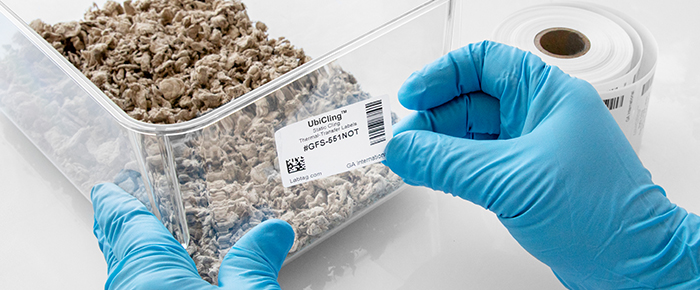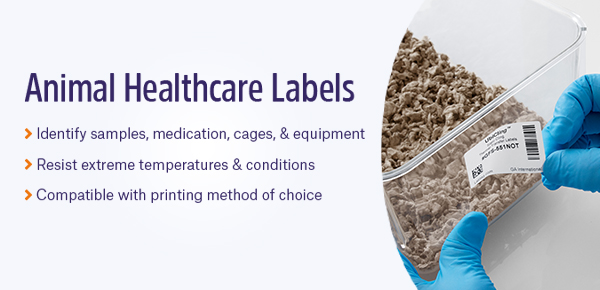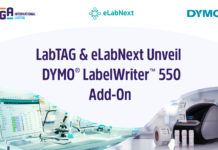
Labeling for animal healthcare can encompass various areas, such as animal housing, husbandry, veterinary care, and diagnostics. Depending on if your labeling equipment, surgical material, or valuable sample, different specialized labels may be required. This can include cryogenic labels for storing specimens, sterilization labels used in veterinary clinics, and documentation labels for accurately identifying paperwork.
Veterinary labels for low temperature storage
Animal husbandry requires labels that can withstand long-term storage in ultra-low temperature freezers (-80°C/-112°F) and liquid nitrogen tanks (-196°C/-321°F), as well as transportation on dry ice. The process of animal care and selective breeding necessitates that oocytes, sperm, and embryos be stored under these cryogenic conditions, typically placed in cryo straws or vitrification devices. As such, accurate labels that can also withstand the vitrification process are a must.
Specialty labels can also be an asset when storing valuable samples in liquid nitrogen or low temperature freezers. Tamper-evident or destructible cryo labels are perfect for adding an extra layer of security to your sample identification during secure storage and transportation of valuable or sensitive biological samples. These labels will tear up or destroy upon any attempt to remove them, clearly indicating any attempt to tamper or access the sample. Their practical design reduces the risk of accidental seal ruptures yet ensures they will easily destruct upon removal. Cryogenic labels for already frozen surfaces are also available for containers and specimens that need to be labeled post-freezing. This eliminates the need to thaw the samples prior to labeling, reducing the risk of the sample being degraded from repeat freeze-thaw cycles. The labels can also be provided in a blackout format for obscuring pre-existing labels that may contain incorrect or obsolete information.
Chemical-resistant labels for diagnostics
Diagnostics is a vital part of animal healthcare, helping to properly treat animals when they fall ill. This typically involves using histology or pathology techniques to diagnose the issue, using a tissue specimen or biopsy. These procedures will often use various harsh chemicals and solvents, requiring that the labels used to identify the samples throughout the process resist these conditions and will not smear, smudge or peel.
Bottles, containers, volumetric labware, and material used during these histology/pathology procedures should at the very least withstand spraying and wiping with alcohols or disinfecting agents, routinely used for the purpose of decontamination. Specialized chemical-resistant veterinary labels are also required for each step of the histology process. This includes xylene-resistant labels for identifying slides during the clearing and tissue preparation stage. Solvent-resistant labels that will adhere to paraffin wax are recommended for cassettes embedded in wax prior to sectioning, and stain-proof labels are suggested for identifying slides that will undergo histological staining protocols to ensure they do not acquire color from the stains that will obscure their printed information. Formalin tags can also be useful when archiving tissue long-term. These tags are adhesive-free and can be placed in the container along with the sample, in formalin-ethanol mixes, used to preserve the specimen.
Sterilization & autoclave-resistant labels
Veterinary clinics and animal housing facilities need to regularly sterilize their material and equipment to avoid the risk of cross-contamination between animals in their care. Ideally, the material should be placed in bins or pouches designed for this purpose, clearly identified using sterilization labels. Some of the various sterilization methods currently used are steam autoclaves, dry-heat ovens, gamma irradiation, and ethylene oxide gas sterilization. As such, veterinary labels used to identify sterilized material should withstand elevated temperatures (up to +150°C/+302°F) as well as high pressure and moisture environments. Sterilization indicator tape is also helpful to ensure that the material when through the sterilization cycle.
Autoclave-resistant labels are perfect for veterinarians and vet technicians that need to sterilize their surgical instruments and trays between uses. These labels will adhere to metal, glass, and plastic surfaces, perfect for use with Genesis containers, blister packs, and on glassware. Large animal facilities can also use these labels to identify equipment and material sterilized using industrial autoclaves, routinely used to disinfect animal cages and various materials.
Medication labels & veterinary labels for syringes
Blank and pre-printed labels are also necessary to identify veterinary medicine, supplements, and vaccines used by vets and veterinary technicians. Any drugs prepared for administration should include information regarding the drug being administered, its dose, the preparation date, and the technician’s name. This information should be clearly displayed, legible, and ideally also encoded in the form of a barcode for added traceability.
When preparing syringes for administering sedatives and other drugs, the use of syringe labels is highly recommended. These labels should be printed with all necessary information and should follow standard ISO guidelines regarding lettering, color specifications, and general format. The use of flag syringe labels is also suggested as they will not obscure the contents of the syringe, making administration more manageable. Syringes, medication bags, and other drug administration containers can be further augmented with warning and pharmacy communication labels. These veterinary communication labels can provide additional relevant information about the drug, including potential hazards and handling instructions.
Animal housing labels & documentation
General use labels can help keep you and your staff organized. Animal healthcare board and care labels can be used to communicate a patient’s present condition and any special care requirements to all staff members. Veterinary practices and animal clinics use board and care labels to ensure effective care. These labels can include information on the current state of the animal’s care, identify pregnant animals, provide instructions for handling aggressive animals, or simply advising staff about feeding regimens to follow. Static-cling labels are also an option, as these labels will adhere directly to the animal, are readily repositionable, and can be used to identify delicate surfaces, including aquariums and terrariums.
In the office, label printing solutions help keep you organized. These labels can also be printed using various printers, including laser and DYMO, for a cost-efficient labeling solution. Labels allow inventory to be accurately tracked, helps keep your records organized, including legal documents and patient records, and make retrieving information quick and reliable. Available in various colors for color coding and easy visual identification, they can also be provided pre-printed with various standard instructions.
LabTAG by GA International is a leading manufacturer of high-performance specialty labels and a supplier of identification solutions used in research and medical labs as well as healthcare institutions.




